By my twientieth birthday, I knew it was time to start looking seriously for a husband. We didn't have many contacts. It's always more difficult to get married under these circumstances. Men are fussy; they are always looking for a woman with a handsome dowry. If she couldn't provide that, then she should at least be beautiful. Few will look to a woman's wifely qualities. My mother did everything she could to help me find a man. We attended the village church services regularly, in the hope that a good man needing a wife might have been the same thing and spotted her in the congregation. Whenever we heard about a paniyiri or were invited to a wedding, we made sure to attend, and my mother would ask the other villagers about all the men sitting at the other tables, if they were available. Whenever my mother saw strangers walking the village paths, she'd dash to find out who they were and why they were there, and invite them to our house. 'You've travelled so far away to come here,' she'd say, 'come in and refresh yourself before you leave us.' She counted on these people to remember us at a future date.
Sometimes we would be told by a neighbour about an eligible groom who had shown interest in our family. My sihoriani, Niovi, once tried to act as a go-between on my behalf. She had made the effort to speak well to some of her contacts about my family. She told them that we were άρχοντες, despite our poverty. This often makes a good impression. It makes us out as hard-working, proud and φιλόξενοι kind of people. These virtues are highly regarded in mountain culture.
One of Niovi's contacts sent Andrea to visit our village. Andrea couldn't come straight to see me or my family; he had to go to Niovi's house, where he stood out in the yard for quite some time until my mother noticed him.
"Νά τος ο γαμβρος," she whispered to me as she stood by the window in the room - the only room of our house. She went outside to the stamna, on the pretext of needing water. I wasn't allowed to see him at all. Arrangements had to be made first by the parents of the bride through the go-between. We could not be warned about Andreas' arrival, so we could not really make any preparations. The house had to be clean and tidy at all times, and I had to be ready at the drop of a hat to make sure that I could put on my one and only dress and spruce myself up. I had bought some material from the town with the money I earned from olive picking, and had sewn my one and only dress by myself. I was so proud of that dress; it was the first time I was wearing a floral design!
 We did not often look at ourselves in the mirror. It was not the done thing to worry about our appearance. But today was one of those days that demanded it. I wanted to look like those town women who came up to the village to visit their kin. They wore a gold chain round their necks, with a cross dangling off it, and maybe a gold bracelet on one of their hands, while their other hand sported a watch. They usually wore their wedding ring with another ring on top of it - was it out of fear of losing that symbolic band? - and that ring often held a precious stone in a deep bold colour, like red or blue. Their shoes had a pointy tip at the front and were tied to the back of their foot which was supported by a long fine heel. They always wore stockings, and they always carried a coat, even if they did not wear it. "It's so much cooler up here!" they'd say.
We did not often look at ourselves in the mirror. It was not the done thing to worry about our appearance. But today was one of those days that demanded it. I wanted to look like those town women who came up to the village to visit their kin. They wore a gold chain round their necks, with a cross dangling off it, and maybe a gold bracelet on one of their hands, while their other hand sported a watch. They usually wore their wedding ring with another ring on top of it - was it out of fear of losing that symbolic band? - and that ring often held a precious stone in a deep bold colour, like red or blue. Their shoes had a pointy tip at the front and were tied to the back of their foot which was supported by a long fine heel. They always wore stockings, and they always carried a coat, even if they did not wear it. "It's so much cooler up here!" they'd say.Their hair was so tidy, all the bangs piled up neatly in curly layers. It reminded me of a cascading waterfall, like the ones we often saw in the framed pictures hanging on the wall in a shop when the rare occasion arose that we went into the town. Their lips were red and their cheeks looked flushed. How did their faces look so rosy in all weather?
It was Niovi who told me the secret to their rosy cheeks. She had given me the chocolate wrapper. saving it especially for me, and passing it onto me and my sisters secretly. "Rub the wrapper on your cheeks. It will leave a pinky red hue on them." She showed me how to do it by rubbing the paper on her hand below her thumb and forefinger. The wrapper left a faint cloudy red hue on her skin.
ION chocolate is to Greece what Cadbury is to the UK. The packaging has always been red, but the quality of the paper/printing is now improved so that it no longer stains the skin. ION chocolate with almonds is a favorite all over Greece. ION's almond chocolate wrapper is an iconic Greek image, exuding a sense of comfort.
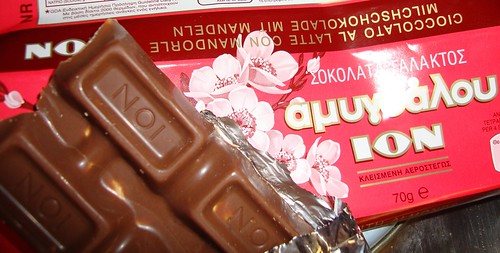

Finally, Andreas and Niovi walked together by our house. They did not initially come towards the house. My mother came out of the door and beckoned them to come in.
"You've come a long way to get here - περάστε κι'από μας!"
 We were all waiting in anticipation in the stable room, where the animals are kept at night. We had no other room in the house to hide in. We weren't really hiding; we were just waiting until our mother told us to enter the house. We could hear the general pleasantries being exchanged, and then finally, a plate placed on the table. Mother had brought out the koulourakia.
We were all waiting in anticipation in the stable room, where the animals are kept at night. We had no other room in the house to hide in. We weren't really hiding; we were just waiting until our mother told us to enter the house. We could hear the general pleasantries being exchanged, and then finally, a plate placed on the table. Mother had brought out the koulourakia. "Zafiria!" She called out to me at this point. "Έλα να βγάλεις το τζερέβελο!"
Nervously smoothening down the skirt of my dress, I entered the room slowly, without looking at anyone. I went straight to the small set of shelves that had been built into the wall. We had prepared the bowl of tzerevelo earlier and covered it with a clean tea towel. A small carafe of raki had been placed right next to the bowl, with the raki glasses ready. As I carried the bowl to the table, from the corner of my eye, I could discern that Andreas was a handsome man, a real leventi. After leaving the plate on the table, I took a seat on one of the divans. We had covered them with one of my weaving creations: a bright red coverlet with coloured tassles strung around the edges. It brightened up the otherwise dull grey colours of the room.
 "Δεν έφερες κι'ένα ποτήρι νερό τ'ανθρώπου για να δροσιστεί;" My mother reprimanded me for not bringing a glass of water to the guests. I had just sat down when my mother spoke crossly to me. I made my way to the cabinet and brought out two glasses. The pitcher of water sat by the hearth. As I picked it up, I realised it was nearly empty. Horrors! What would Andreas and Niovi be thinking about us? We were like the unprepared virgins in the parable; we were not ready to receive the bridegroom.
"Δεν έφερες κι'ένα ποτήρι νερό τ'ανθρώπου για να δροσιστεί;" My mother reprimanded me for not bringing a glass of water to the guests. I had just sat down when my mother spoke crossly to me. I made my way to the cabinet and brought out two glasses. The pitcher of water sat by the hearth. As I picked it up, I realised it was nearly empty. Horrors! What would Andreas and Niovi be thinking about us? We were like the unprepared virgins in the parable; we were not ready to receive the bridegroom."Είναι άδεια η στάμνα," I apologised to everyone in the room. "Θα πάω να την γεμίσω." This was not the most appropriate job for me in my floral dress. Water was bound to spill on me, and I would be put in an ungraceful position: back bent over the well, a heavy object in my embrace. I tried to think positively; this was an opportunity for Andreas to see me in my role as keeper of the house.
 It was a positively warm day. Although the slight breeze kept the air cool, the hot sun burned the skin where no shade could be provided. We kept the well covered with brushwood so that animals did not fall in. As I filled the pail and poured the water into the stamna, I thought about where Andrea might be taking me. I knew he was from a village located on the lower slopes of the mountain. That was good; it wasn't necessary for me to live in the town, but anywhere on lower ground sounded good to me. The mountains had been my home and playground all my life. They did not mesmerise me; they signalled isolation, poverty, a stagnant inertia that clouded my mind, gnawing away at my dreams, filling me with desolation.
It was a positively warm day. Although the slight breeze kept the air cool, the hot sun burned the skin where no shade could be provided. We kept the well covered with brushwood so that animals did not fall in. As I filled the pail and poured the water into the stamna, I thought about where Andrea might be taking me. I knew he was from a village located on the lower slopes of the mountain. That was good; it wasn't necessary for me to live in the town, but anywhere on lower ground sounded good to me. The mountains had been my home and playground all my life. They did not mesmerise me; they signalled isolation, poverty, a stagnant inertia that clouded my mind, gnawing away at my dreams, filling me with desolation.The mountains are nice to look at, but they're not easy places to live in at all. They're very much a part of a Hanioti's life, as the main mountain range in Hania, Lefka Ori (the White Mountains), located in the centre of the prefecture, is highly visible in the whole area. The photo above is taken from our olive field; the photo below was taken only 250m away from the beach.


The sun was streaking its rays through a distant cloud. All of a sudden, the mountain peak which was covered in snow took on a brilliant shine that lit the afternoon sky. The stamna had finally filled to the top, spilling a little over the rim. My hands were dry and dusty, streaked brown by the moistened dirt. I carefully washed my hands, taking care not to stain my floral patterned dress, the one pretty item I owned that reminded me that I was a woman in search of comfort. Just before I picked up the stamna, I rubbed my moist clean hands over my face to refresh my skin. The cool water provided a welcome relief from the heat.
My mother left her mountain village in 1963; after migrating to NZ, she visited Greece twice and took a day trip back to her village on both occasions. The 10-minute video segment below shows (in colour) what Hania looked like in 1961.
I picked up the stamna and made my way back to the house. As I entered the room, everyone looked up. "What took you so l--." My mother finished her sentence with a jolt. She was staring intently at me. As was everyone else, including Andreas.
My mother finally broke the silence. "What happened out there? Couldn't you fetch some water without scratching yourself?" I had no idea what she was talking about. One of my sisters took out her handkerchief and moistened it with some water. She rushed towards me and began wiping down my cheeks. She had a frightened look on her face. I noticed a pinky red stain on the linen. What on earth had happened to me?
*** *** ***
Nothing else was said about the incident. Andreas and Niovi did not stay long, nor did they say much. In any case, I was too stunned to remember any of the conversation. They drank their coffee in quick deep swills, and then they moved on, she to her house, Andreas to his donkey, presumably to ride back down the hill to his lower village home.
Needless to say, I never saw Andreas again. I threw away all the chocolate wrappers, and it had been decided mutually that our family must never talk to Niovi again. That woman gave us nothing but trouble. Hopefully Andreas will keep the incident to himself.
Many thanks to Aggie for the chocolate wrapper story, which sparked off this tale. The black-and-white photos have been taken from George Meis postcard and calendar photography, and John Donat's photography book "Crete 1960". The video by John Sooklaris can be found on youtube.
And many thanks, once again, to my faithful editors on opposite sides of the coast.
©All Rights Reserved/Organically cooked. No part of this blog may be reproduced and/or copied by any means without prior consent from Maria Verivaki.
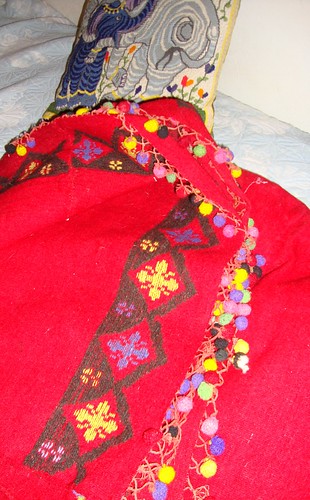
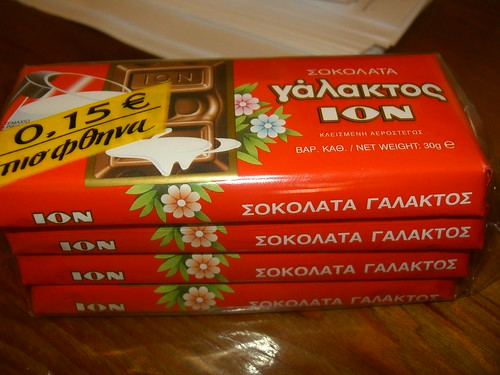
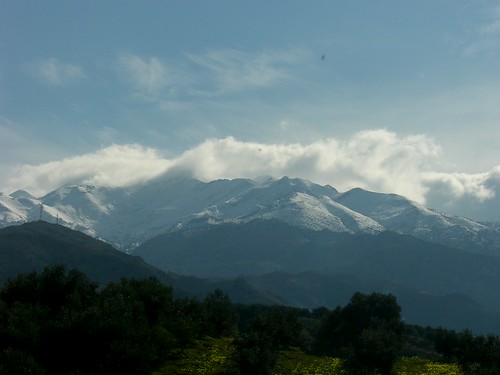
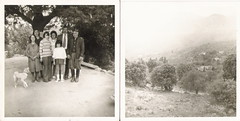
Thanks for posting,I enjoyed it.
ReplyDeleteYanni
Very nice story and delivered in a nice way as well.
ReplyDeleteThe video is incredible. In a way i prefer this "utility" view of the harbour rather than the touristically stylised one...And although there's space, it is not filled with cars or people. Maybe the video was shot on a Sunday, at the time when everybody was at the church :-)
All the best
AA
What an incredible story. I can't believe that wrappers were used to tint cheeks, very interesting!
ReplyDeleteI enjoyed reading Maria. Life was certainly different back in the 60's. If we were secluded nowadays we could find a man on-line...wink.
ReplyDeleteThat's a very lovely story, Maria. That could sell a lot of chocolates, you have a talent as a copywriter!
ReplyDeleteGreat story Maria. I enjoyed reading it!
ReplyDelete